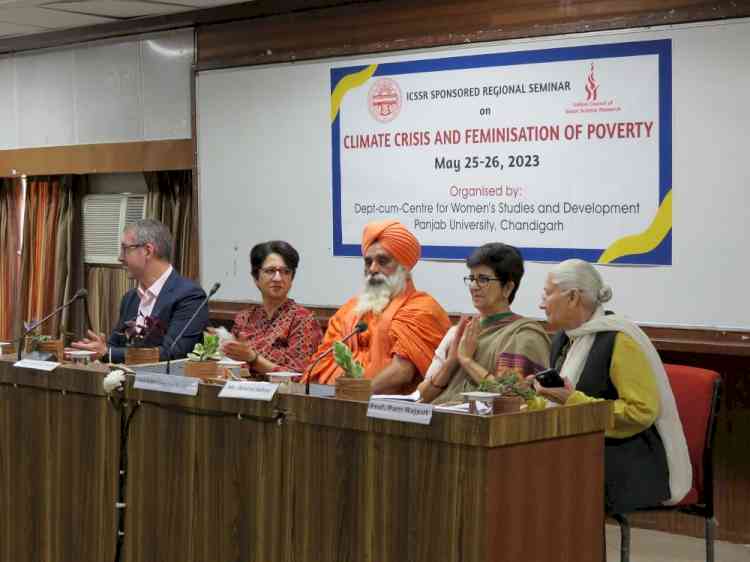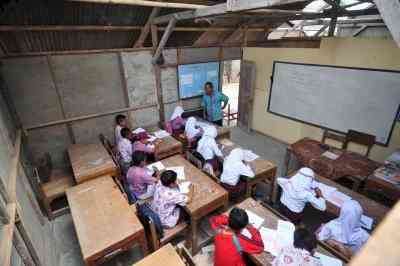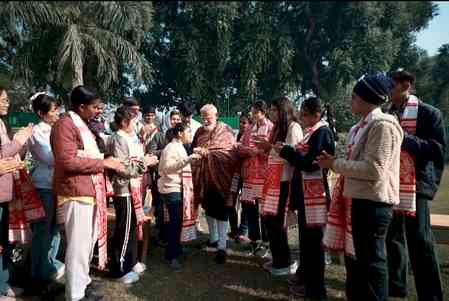ICSSR sponsored Seminar on Climate Crisis and Feminisation of Poverty
Climate crisis is an issue of the survival of humanity, of melting glaciers, of sinking islands, of the whale with a ton of plastic in its stomach, of the polar bear which has lost its habitat, of corals which have lost their colour and many more.

Chandigarh, May 26, 2023: Climate crisis is an issue of the survival of humanity, of melting glaciers, of sinking islands, of the whale with a ton of plastic in its stomach, of the polar bear which has lost its habitat, of corals which have lost their colour and many more. These were the ideas which emerged at the ICSSR sponsored Seminar on Climate Crisis and Feminisation of Poverty organized by the Department-cum-Centre for Women’s Studies and Development, Panjab University, Chandigarh. Inaugurating the Seminar, Sant Baba Balbir Singh Seechewal, noted environmentalist, Padma Shree awardee and Member Rajya Sabha inaugurating the seminar highlighted the environmental aspect of our ancient and medieval scriptures. He emphasized that that Guru Nanak had laid focus on “Pawan guru, Paani pita”. But we got into trouble when we ignored the teachings of the sages. He further emphasized that the Indian Constitution too put upon us the duty of conserving the environment, but we did not pay heed to it. It is the educated upper class, he stressed who fail in their duty of creating awareness as well as contribute to environmental degradation.
Aparna Sahay former Member Secretary, Rajasthan State Commission for Women, highlighted the role women can play in decision-making in Climate Change, particularly in the context of Sustainable Development Goals. She cited the example of the Sendai plan , a city which was badly effected by a Tsunami. However the local people and the Government together managed to rebuild the city. Climate crisis, she emphasized has to be tackled through a gender lens failing which all efforts at tackling the situation will come to nought.
Prof.Rumina Sethi, Dean University Instruction in her presidential remarks, began with an anecdote about a judge who was not happy with the ways things are being projected when it comes to women. He felt that men are equally oppressed. She emphasized upon the heterogeneity of women’s issues and their multiple marginalizations. She looked at the way women are linked with the environment, control over their sexuality and control over environment. She concluded by citing the example of the Narmada Bachao Andolan which impacted women differently from men, but no heed was paid to their problems, because this was dictated by the funding agency.
Prof. Pam Rajput also emphasized upon the need to involve women in decision-making on issues of climate change. Women, she stated has been the conservator of the environment; her indigenous knowledge can help restore the biosphere. In 1992, at the time of the Rio conference, 145 gender issues related to the environment were taken up. Many gender issues were raised after that, but still women not brought to the decision-making table. We also need to question the model of development which has led to this climate crisis.
Patrick Hebert, Consul General of Canada in Chandigarh pointed out that the next few years are going to be very dangerous and hazardous. He highlighted a number of initiatives taken up by the Canadian Government for this including gender advocacy.
Earlier, welcoming the guests, Prof. Manvinder Kaur, Chairperson of the Dept.-cum-Centre for Women’s Studies and Development emphasized that we do not own the earth, we have merely rented it from the future generations and we should leave it in a pristine condition for the coming generations. The doomsday clock is ticking and we need to hear it.
The Inaugural Session was followed by a Panel discussion in which Prof. Suman Mor from the Dept of Environmental Sciences, Prof. Prabhjyot Kaur, agrometeorologist from Punjab Agricultural University, Prof.Simrit Kahlon from Department of Geography highlighted the role of women in dealing with climate crisis and the need to adopt a feminine way of handling the problem. The second Panel Discussion saw the participation of women who are the frontlines of working on the theme of climate change. Jyoti Arora, from Daily Dump organization highlighted the need for waste segregation and management. Samita Kaur from Warrior Moms stressed upon the need to handle environmental pollution for the next generation and Harsharan Kaur from SEWA focused upon the role of SEWA in handling issues of poverty stricken women.
The Seminar also saw paper presentations on themes such as agricultural distress, food security, livelihoods, impact upon vulnerable regions, violence against women as well as gendered adaptation strategies. The last session of the Seminar was dedicated to deciding the future strategy so that the deliberations of the seminar do not remain within the four walls of the Seminar Hall. An action group titled WeAct was created to strategise and bring about change starting from the University itself. It was attended by about 80 participants.



 City Air News
City Air News 










